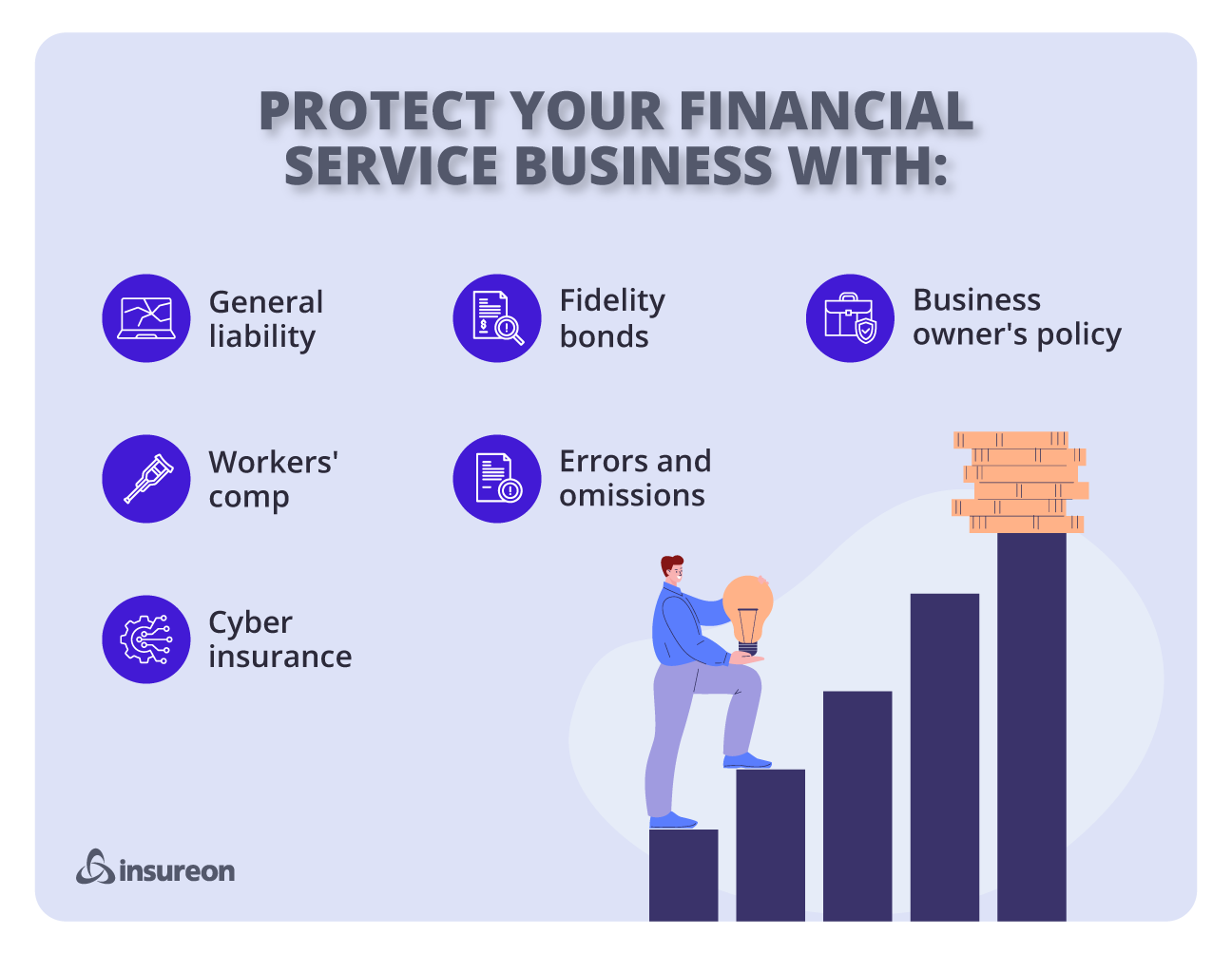
Top finance professionals we insure
Don't see your profession? Don't worry.
We insure most businesses.
Recommended insurance policies for financial service professionals
An accounting error, data breach, or office injury could devastate a small finance business. Business insurance helps accountants and other finance professionals recover quickly from lawsuits and other unexpected costs.
Professional liability insurance
This policy covers legal defense costs if a business is sued over an error that caused a client to lose money. It's sometimes referred to as errors and omissions insurance (E&O).
- Accounting errors
- Missed deadlines
- Accusations of negligence
General liability insurance
This policy covers basic accounting risks, such as customer injuries and property damage. Bundle it with property insurance for savings in a business owner’s policy.
- Slip-and-fall accidents
- Damaged customer property
- Libel and slander lawsuits
Business owner's policy
A business owner's policy, or BOP, is a cost-effective way for financial professionals to purchase general liability coverage and commercial property insurance together.
- Slip-and-fall accidents
- Accidental damage to client property
- Stolen or damaged business property
Workers’ compensation insurance
Most states require workers' comp for businesses that have employees. It also protects sole proprietors from work injury costs that health insurance might deny.
- Employee medical expenses
- Disability benefits
- Employee injury lawsuits
Cyber insurance
This policy helps accountants, bookkeepers, and other financial experts survive data breaches and cyberattacks by helping to pay for recovery expenses and associated costs.
- Client notification expenses
- Fraud monitoring services
- Data breach investigations
Commercial auto insurance
Commercial auto insurance covers costs if a financial business's vehicle is involved in an accident. Most states require this coverage for vehicles owned by a business.
- Property damage caused by your vehicle
- Auto accident injuries
- Vehicle theft and vandalism
How much does insurance cost for financial institutions?

Business insurance can be affordable for a small financial firm.
Several factors insurance companies look at when calculating insurance costs, includes:
- Types of financial services offered
- Your business property and equipment
- Annual business revenue
- Where your business operates
- How many employees you have
- Other insurance products or bonds you carry

How do I get business insurance for financial institutions?
It’s easy to find insurance for finance and accounting businesses. Whether you’re a stockbroker, financial advisor, or hedge fund asset manager, you’ll need to have some basic information about your business available.
Our application will ask you for your annual revenue and payroll, among other details. You can buy a policy online and get a certificate of insurance with Insureon in three easy steps:
- Complete a free online application.
- Compare free quotes and choose a policy.
- Pay for your policy and download a certificate for proof of insurance.
Insureon's dedicated team of licensed insurance agents works with top-rated U.S. providers to find the right insurance solution for your specific needs, whether you’re an independent mutual funds manager or operate a private equity firm with several employees.
Verified business insurance reviews
Hear from customers like you who purchased small business insurance.
FAQs about financial services insurance
Do finance and accounting professionals need professional indemnity insurance?
Professional indemnity insurance is a type of insurance coverage that protects professional services businesses, such as an accounting firm, from claims of:
- Professional negligence
- Financial loss due to your provided service
- Misconduct
- Breach of contract
- Misrepresentation
- Failure to deliver on promised services
This policy is often called different names depending on the industry, for example, errors and omissions (E&O) in real estate, professional liability in construction, and malpractice in the legal and medical fields.
While this policy is not always mandated by state law, it can be required by clients or local jurisdictions. Professional indemnity is one of the most important policies a finance professional should have for risk management.
Allegations of professional errors, negligence, and inaccurate advice, even frivolous ones, can result in hefty expenses on your business. Professional indemnity coverage can protect you from the financial burden of a lawsuit.
Why should accountants and finance businesses carry cyber insurance?
Businesses in the financial industry often work with and store personally identifiable information (PII) about their clients.
This type of data is extremely tempting to cyber criminals, making your small business a likely target for cyber risks, such as a data breach.
Cyber insurance, also called cyber liability or cybersecurity insurance, protects small businesses from the high costs associated with a data breach or malicious software attack.
First-party cyber liability insurance, sometimes called data breach insurance, offers protection from cyberattacks that directly impact your business.
This policy covers expenses such as:
- Customer notification costs
- Credit monitoring
- Legal fees
- Fines
What's more, you can often easily add this coverage to your general liability policy during the underwriting process.
What other insurance policies should finance and accounting professionals carry?
To fully protect your financial or accounting business from complex risks and exposures, you may need additional types of insurance, including:
- Fidelity bonds, also called commercial crime insurance or employee dishonesty coverage, provide reimbursement if one of your employees commits fraud, theft, or forgery against a client or your business. Unlike insurance, the policyholder must pay back the bond amount to the insurer or lender.
- Business income insurance, also known as business interruption coverage, offsets lost net income if your business is forced to close because of a covered peril, such as property damage.
- Employment practices liability insurance (EPLI), sometimes called EPL insurance, protects your small business if an employee sues over wrongful termination, sexual harassment, or another violation of employee rights.

Want free expert advice right in your inbox?
By entering your email address and subscribing, you agree to our Terms of Use and Privacy Policy
Read our blog posts


The number of small businesses in the U.S. has increased rapidly over the last several years. As a result, the demand for bookkeepers is also on the rise. For many small businesses, working with a...

Landlords often require business owners to carry commercial lease insurance. Learn why you may need to purchase tenant insurance before signing a lease, and the types of coverage you may need to...






